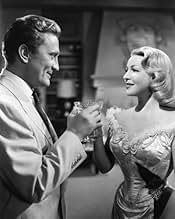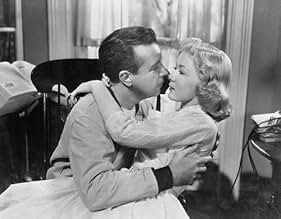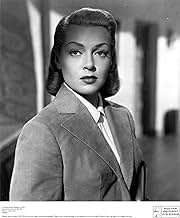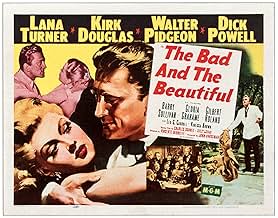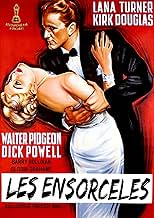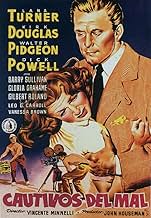An unscrupulous movie producer uses an actress, a director and a writer to achieve success.An unscrupulous movie producer uses an actress, a director and a writer to achieve success.An unscrupulous movie producer uses an actress, a director and a writer to achieve success.
- Director
- Writers
- Stars
- Won 5 Oscars
- 7 wins & 7 nominations total
Jay Adler
- Mr. Z - Party Guest
- (uncredited)
Stanley Andrews
- Sheriff
- (uncredited)
Ben Astar
- Joe - Party Guest
- (uncredited)
Barbara Billingsley
- Evelyn Lucien - Costumer
- (uncredited)
- Director
- Writers
- All cast & crew
- Production, box office & more at IMDbPro
Featured reviews
Glossy MGM soaper has many things to recommend it, not the least of which is a surprisingly grounded, natural Lana Turner (looking great, even in ordinary jammies) playing a successful movie actress who, along with a top screenwriter and director, help producer-on-the-skids Kirk Douglas stage a comeback. Not especially revealing about Hollywood, which at this stage wasn't quite ready to unmask itself, but still engaging and intriguing. Douglas is well-cast (he spits out his lines with a terse jaw--nothing new--but he's right for this part and is commendable). Turner is a revelation and deserved at the very least an Oscar nomination for her work; the picture did go on to win Academy Awards in five categories, including Gloria Grahame as Best Supporting Actress; Charles Schnee, Best Screenplay; Robert Surtees, Best Cinematography, Black-and-White; Best Art Direction-Set Decoration, Black-and-White; and Best Costume Design, Black-and-White. Well-directed by Vincente Minnelli, the picture gets less attention than something like "All About Eve", but it's actually more entertaining. *** from ****
My tribute to the great Hollywood film composer, David Raksin, is long overdue. I only discovered the other day that he died a couple of summers ago at the considerable age of 92. I suppose I had thought that like most of those figures who reached their peak in the middle of the last century he had passed away many years ago. A re-seeing of "The Bad and the Beautiful" fairly recently reminded me of just how outstanding was his contribution to movies of all shades of quality. I first became aware of the uniqueness of the Raksin 'sound' on my original viewing of Wyler's "Carrie" in 1952. It is impossible to define, other than to say that it owes nothing to central European romanticism, the sound of almost all the in-house studio composers such as Newman, Stothart and Steiner, or to the tradition of 20th century symphonists such as Copland and Diamond which fed the imagination of film composers as diverse as Elmer Bernstein and David Amram. Raksin had a sound all his own as did Bernard Herrmann and Miklos Rozsa, as instantly recognisable as theirs but I feel his range is wider. He seldom repeated himself as did Rozsa who composed in the same style regardless of genre. ("Double Idemnity", "Ben-Hur" and "Madame Bovary" have nothing common apart from their same sort of watered down Kodaly-like music.) His style is intensely lyrical, conceived with a verve and passion that always transcended the most trivial movies and made them, if not worth watching, always worth listening to. Unlike many of his colleagues he seldom hit the jackpot by working on films of great quality. I think it only happened twice, with Abraham Polonsky's B movie "Force of Evil" which has become recognised as a marvellous example of film noir and of course William Wyler's "Carrie" where he was just one of many outstanding contributors to what I have long argued is possibly the greatest work of art to have ever emerged from the Hollywood studio system. Although it has its passionate advocates, I cannot share their enthusiasm for Vincente Minnelli's "The Bad and the Beautiful". It is certainly very professional in the way it slickly dissects an unsympathetic character through the flashback reminiscences of those he mistreated, but it had all been done before and considerably better in "Citizen Kane" and "All About Eve". However the film is worth watching if only to wallow in Raksin's gorgeous score. And there is plenty of it, particularly in accompanying all those voice-off narrations. And then just as one is beginning to wonder if the marvellous opening credit theme is about to be heard once too often, the composer introduces something entirely new for the Dick Powell narrative, a jaunty section based on a four-note motif (a falling perfect fifth, rising up a major sixth, then down a major seventh). The way this is subsequently developed is truly symphonic. Incidentally if you want to discover a film score that has the length and complexity of a symphony just close your eyes (you won't be missing much) and listen to "Forever Amber". Raksin in excelsis!
"The Bad and the Beautiful" takes a look at Hollywood. This incisive take about how movies are made, directed by Vincente Minnelli, dares to go behind the scenes to show what goes on in the way the film industry operates. The film adaptation by Charles Schnee gives us a good idea of that unreal world of fantasy and hype.
At the center of the story is Jonathan Shields, a young man with connections to the industry. He wants to follow his father's footsteps and goes at it vigorously, making friends and enemies along the way. Jonathan discovers he can be ruthless whenever he wants. His first victim is Fred Amiel, the talented director who Jonathan bypasses in favor of a more established one. Jonathan quickly forgets the friendship Fred and his wife showed him before becoming a big producer.
Then there is there is Georgia Larrion, the boozy daughter of a famous actor. Jonathan shows how he wants Georgia to succeed in the business, personally taking care of selling her to star in his big project, only to betray her with another woman, a glamorous bit player. When Georgia discovers the truth, she flees Jonathan's mansion in a clear night that suddenly turns into a torrential downpour and loses control of the car, but she doesn't suffer a scratch!
The last victim of Mr. Shields is the Pulitzer prize winner, James Lee Bartlow, who Jonathan coaxes into leaving his academic life to adapt his own novel for the movies. James is married to the flighty Rosemary, in whom Jonathan discovers a weak link that will do anything to hobnob with the celebrities. Jonathan makes it easy for Rosemary to fall into an affair with the star of Shields' film.
When we first watched this film, it seemed much better, than on this viewing where a lot of things surface to make some of the story much weaker than before. Some viewers have compared this film with the fate of Orson Welles in Hollywood, and there are a couple of references that could be interpreted that way. Whether it was so, or not, it's up to the viewer to guess where the truth lies.
Kirk Douglas gave a strong performance as Jonathan Shields. Mr. Douglas showed he clearly understood who this man was. He runs away with the film, in our humble opinion. Lana Turner, a beautiful presence in any movie, is good, but at times she appears to be overwhelmed by the range of emotions she has to project, especially with that phony car scene.
Dick Powell and Gloria Graham put in an excellent appearance as the Bartlows. Barry Sullivan disappears after Lana shows up, not to be seen until the end. Walter Pigeon is effective as the studio head. Gilbert Roland is perfect as Gaucho, the Latin actor with a lot of charisma.
Mr. Minnelli shows he wasn't afraid to portray the industry the way we see it in the film, not a small accomplishment, knowing well how it could have backfired on him. Hollywood is not forgiving to those who dare to show its ugly side and that's when the parallel with Orson Welles problems with the system and eventual exile can be drawn.
At the center of the story is Jonathan Shields, a young man with connections to the industry. He wants to follow his father's footsteps and goes at it vigorously, making friends and enemies along the way. Jonathan discovers he can be ruthless whenever he wants. His first victim is Fred Amiel, the talented director who Jonathan bypasses in favor of a more established one. Jonathan quickly forgets the friendship Fred and his wife showed him before becoming a big producer.
Then there is there is Georgia Larrion, the boozy daughter of a famous actor. Jonathan shows how he wants Georgia to succeed in the business, personally taking care of selling her to star in his big project, only to betray her with another woman, a glamorous bit player. When Georgia discovers the truth, she flees Jonathan's mansion in a clear night that suddenly turns into a torrential downpour and loses control of the car, but she doesn't suffer a scratch!
The last victim of Mr. Shields is the Pulitzer prize winner, James Lee Bartlow, who Jonathan coaxes into leaving his academic life to adapt his own novel for the movies. James is married to the flighty Rosemary, in whom Jonathan discovers a weak link that will do anything to hobnob with the celebrities. Jonathan makes it easy for Rosemary to fall into an affair with the star of Shields' film.
When we first watched this film, it seemed much better, than on this viewing where a lot of things surface to make some of the story much weaker than before. Some viewers have compared this film with the fate of Orson Welles in Hollywood, and there are a couple of references that could be interpreted that way. Whether it was so, or not, it's up to the viewer to guess where the truth lies.
Kirk Douglas gave a strong performance as Jonathan Shields. Mr. Douglas showed he clearly understood who this man was. He runs away with the film, in our humble opinion. Lana Turner, a beautiful presence in any movie, is good, but at times she appears to be overwhelmed by the range of emotions she has to project, especially with that phony car scene.
Dick Powell and Gloria Graham put in an excellent appearance as the Bartlows. Barry Sullivan disappears after Lana shows up, not to be seen until the end. Walter Pigeon is effective as the studio head. Gilbert Roland is perfect as Gaucho, the Latin actor with a lot of charisma.
Mr. Minnelli shows he wasn't afraid to portray the industry the way we see it in the film, not a small accomplishment, knowing well how it could have backfired on him. Hollywood is not forgiving to those who dare to show its ugly side and that's when the parallel with Orson Welles problems with the system and eventual exile can be drawn.
That one line summary makes me sound like I'm calling the Bad and the
Beautiful a case in 'tough love', where director Vincente Minnelli wags
his finger at what happens to some people (cough, David O. Selznick,
cough), while also showing too the joys of working in the business. But
it's a business at its most booming time, coming out of the 40s where
the producer was king, and the director had to vie for room at times to
really get his vision in. Here the producer Jonathan Shields is played
by Kirk Douglas as someone with big ideas at first- he even has an idea
to help make a scary movie about cats even more frightening by not
showing the cats (echoes of Val Lewton). Soon he rises the ranks and
becomes big enough to really call the shots all he wants, but it also
gets in the way of personal relationships, severs ties, and sometimes
even makes him out to be monstrous (there's one shot I remember all the
time where Douglas, in a big fit of anger against Lana Turner's
character, seems like he's a whole foot taller with the ego almost
manifested). The narrative of the film is a retelling by people who
knew him, a sexy but soon disillusioned actress, a director who once
worked with Shields but then got cut off from him, and a writer played
by Dick Powell.
Rashomon or Citizen Kane it is not in trying to reveal more grandiose and amazing things about human nature, but rather a supreme rumination on the good times and the bad times, possibly more of the latter.
What's great about Douglas's portrayal is that through the stories from the three ex-friends and co-workers and lovers, he becomes a very well-rounded character. At the core, of course, is the producer who at the time had as more creative say than anyone else on the set. This brings some of the great scenes ever shown about movie-making, such as the moment when Amiel, the director, tries to put Jonathan in his place about how a scene should be shot, "in order to direct a picture you need humility". Another comes with the moment when Jonathan and his soon to be 'asistant to the producer' has to object out of just being stunned. But more than Douglas, it's also tremendous, memorable screen time for Lana Turner, perhaps in her most successful performance in just sheer acting terms (not necessarily just in presence or style like in other pictures), and for Dick Powell, who with this and Murder My Sweet has two defining roles outside of his usual niche.
With many sweet camera moves, a script that crackles with the kind of scenes and dialog that makes one wish for the glory times of Hollywood's Golden Age, and at least four or five really excellent performances, The Bad and the Beautiful might not be as astounding and near-perfect as 8 1/2 or as funny as Bowfinger, but it ranks up there with the best movies about movie-making, and can make for some fine entertainment even for those who aren't really interested in how movies are made.
Rashomon or Citizen Kane it is not in trying to reveal more grandiose and amazing things about human nature, but rather a supreme rumination on the good times and the bad times, possibly more of the latter.
What's great about Douglas's portrayal is that through the stories from the three ex-friends and co-workers and lovers, he becomes a very well-rounded character. At the core, of course, is the producer who at the time had as more creative say than anyone else on the set. This brings some of the great scenes ever shown about movie-making, such as the moment when Amiel, the director, tries to put Jonathan in his place about how a scene should be shot, "in order to direct a picture you need humility". Another comes with the moment when Jonathan and his soon to be 'asistant to the producer' has to object out of just being stunned. But more than Douglas, it's also tremendous, memorable screen time for Lana Turner, perhaps in her most successful performance in just sheer acting terms (not necessarily just in presence or style like in other pictures), and for Dick Powell, who with this and Murder My Sweet has two defining roles outside of his usual niche.
With many sweet camera moves, a script that crackles with the kind of scenes and dialog that makes one wish for the glory times of Hollywood's Golden Age, and at least four or five really excellent performances, The Bad and the Beautiful might not be as astounding and near-perfect as 8 1/2 or as funny as Bowfinger, but it ranks up there with the best movies about movie-making, and can make for some fine entertainment even for those who aren't really interested in how movies are made.
Part of what makes this film good is that Kirk Douglas's character is not shown as being completely evil - he manipulates people and can be ruthless about discarding them, but he's got real talent and is good for the career of everyone he comes in contact with. "Don't worry, some of the best movies are made by people working together who hate each other's guts," he says at one point, showing that (at least after he's established his own name) he cares most about making quality movies. I found authenticity in the nuances of this personality - he's ambitious, driven, knows how to get his way and the most out of other people, is self-aware, discerning, and artistic. Oh, and he's also kind of an asshole.
It's a film that starts slow and perhaps takes a little too long establishing his character, and the first story is a little less interesting than the two which follow. The film is told in flashbacks and explains how a director (Barry Sullivan), actor (Lana Turner), and a screenwriter (Dick Powell) don't want anything to do with him anymore after he runs afoul of each in different ways over his career. You see, he's calling them up now and hoping each will work on a new project of his, and none of them even want to talk to him.
The film really picks up with Turner; she turns in a strong performance and I loved the pathos of her story. She plays the alcoholic daughter of a great actor who doesn't have the same talent, and yet Douglas recognizes her star power. The scene where he starts questioning the shrine she has to her father and she attacks him was the point at which I thought the film may really have something. Powell is good too, and aided considerably by Gloria Grahame, who plays his wife and appears at about the 1:20 point and then lights up the screen for the moments she's on it, southern accent and all. What passion there is in the way she kisses Powell's character, and how she says "James Lee, you have a very naughty mind...I'm happy to say." The film's biggest moment belongs to Douglas however, when he explodes at Turner after she comes to his place following an opening night party - one that certainly must be among the best in his career.
Overall, it's an interesting look at Hollywood, and more generally, talent and ambition. I wasn't sure what would happen once the flashbacks were told and we returned to the present, and thought the ending was clever too.
It's a film that starts slow and perhaps takes a little too long establishing his character, and the first story is a little less interesting than the two which follow. The film is told in flashbacks and explains how a director (Barry Sullivan), actor (Lana Turner), and a screenwriter (Dick Powell) don't want anything to do with him anymore after he runs afoul of each in different ways over his career. You see, he's calling them up now and hoping each will work on a new project of his, and none of them even want to talk to him.
The film really picks up with Turner; she turns in a strong performance and I loved the pathos of her story. She plays the alcoholic daughter of a great actor who doesn't have the same talent, and yet Douglas recognizes her star power. The scene where he starts questioning the shrine she has to her father and she attacks him was the point at which I thought the film may really have something. Powell is good too, and aided considerably by Gloria Grahame, who plays his wife and appears at about the 1:20 point and then lights up the screen for the moments she's on it, southern accent and all. What passion there is in the way she kisses Powell's character, and how she says "James Lee, you have a very naughty mind...I'm happy to say." The film's biggest moment belongs to Douglas however, when he explodes at Turner after she comes to his place following an opening night party - one that certainly must be among the best in his career.
Overall, it's an interesting look at Hollywood, and more generally, talent and ambition. I wasn't sure what would happen once the flashbacks were told and we returned to the present, and thought the ending was clever too.
Did you know
- TriviaAt 9 minutes and 32 seconds, Gloria Grahame's performance in this movie became the shortest to ever win an Oscar. She held the record until 1976, when Beatrice Straight won for her 5 minute performance in Network (1976).
- GoofsThe story takes place over an 18-year period, roughly 1934-1952, but the hairstyles and clothing of all the women, from beginning to end, are strictly 1952.
- Alternate versionsAlso available in a computer colorized version.
- ConnectionsFeatured in The World, the Flesh and the Devil (1959)
- How long is The Bad and the Beautiful?Powered by Alexa
Details
Box office
- Budget
- $1,558,000 (estimated)
- Gross worldwide
- $2,025
- Runtime
- 1h 58m(118 min)
- Color
- Aspect ratio
- 1.37 : 1
Contribute to this page
Suggest an edit or add missing content



